Like papaya, cheese, and carrots, blueberries are one of those foods that could easily double as a dog treat or get gobbled up quickly if dropped in the kitchen with a hungry scavenger nearby. But can dogs eat blueberries and—more importantly—are they actually good for them?
We asked a veterinarian to answer some of the most frequently asked questions surrounding canines and blueberries. Curious about whether blueberries are safe for dogs, if they impart any health benefits, and which blueberry-infused human foods are dog-friendly (or not)? Here’s everything you need to know.
Can Dogs Eat Blueberries?

Yes! According to North Carolina-based veterinarian Dr. Judy Morgan, who specializes in integrative veterinary medicine, blueberries are a great alternative to store-bought goodies.
Naturally bite-sized, portable, and delicious, blueberries are safe to use as a reward while dog training. You could also use them as a fancy food topper for special occasions like birthdays or adoption anniversaries.
Are Blueberries Good for Dogs?
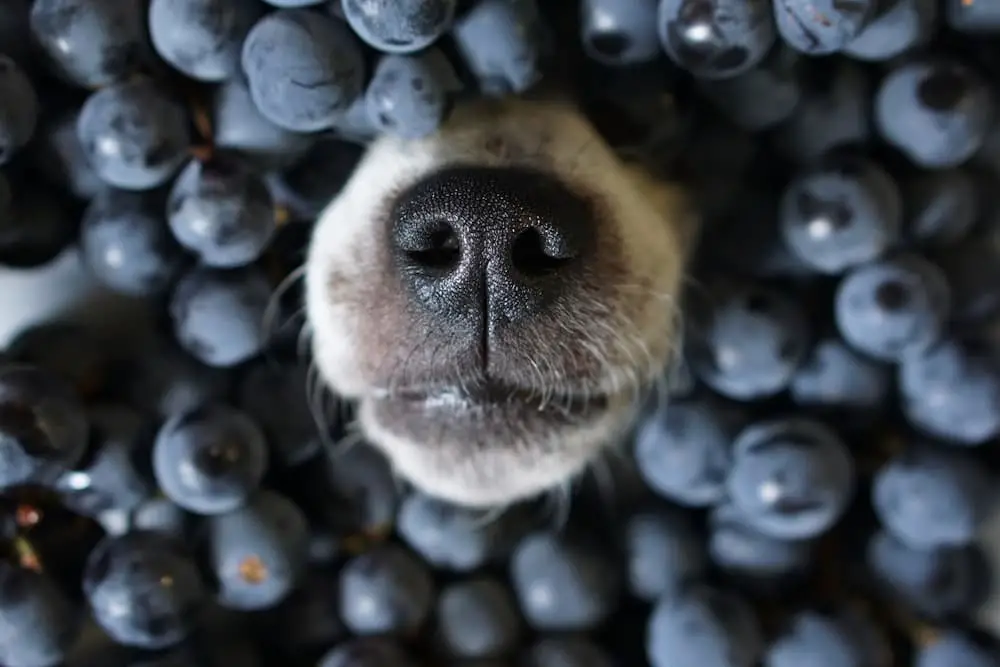
“Blueberries are a very healthy treat and food addition for dogs,” says Morgan.
A well-known “superfood,” blueberries are good for dogs, providing canines with some of the same health benefits they pass on to humans. For this reason, you might find this powerful berry on the ingredients list for some dog treats. (More on this later!)
So, what are the benefits of blueberries for dogs? For one, they’re packed with anthocyanins, the fancy term for a type of antioxidant that fights free radicals or unstable atoms that destroy cells and speed up aging, says Morgan.
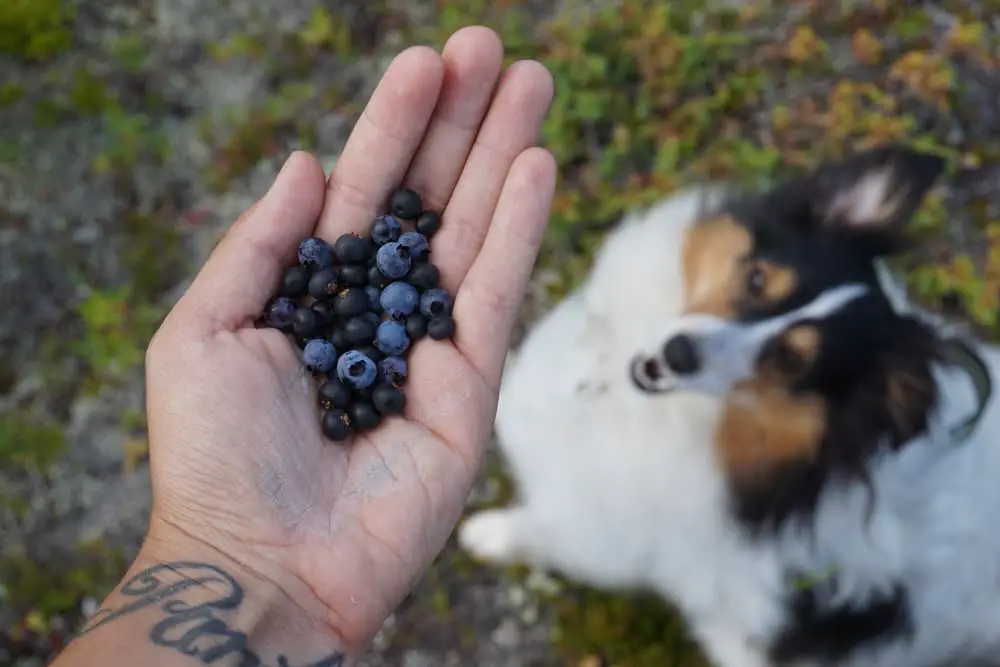
Antioxidants help protect your pooch’s body and brain from these microscopic, destructive forces. This is especially key for older dogs. In fact, studies show a more antioxidant-rich diet can lower the effects of cognitive decline in seniors (1.)
Blueberries also offer up plenty of vitamin C and health-boosting plant-based nutrients, as well as fiber, which helps feed the beneficial bacteria in your dog’s gut that promote a healthy immune system, notes Morgan.
For all the benefits attributed to blueberries, there are some that remain unproven. For example, blueberries are often credited with helping to cure urinary tract infections (UTIs) or remove tear stains from underneath your pup’s eyes. However, according to Morgan, the jury is still out.

“There’s little scientific evidence to support the use of blueberries to treat UTIs—but they won’t hurt, either,” says Morgan.
As far as tear stain removal goes, these rust-colored marks can happen for a number of reasons—one of which may be bacteria on the surface of a dog’s eyes or skin. So changing your dog’s microbiome for the better with foods like blueberries could lead to improvements, says Morgan. But, again, there’s no research to back this up as a go-to treatment.
Are Blueberries Bad for Dogs?
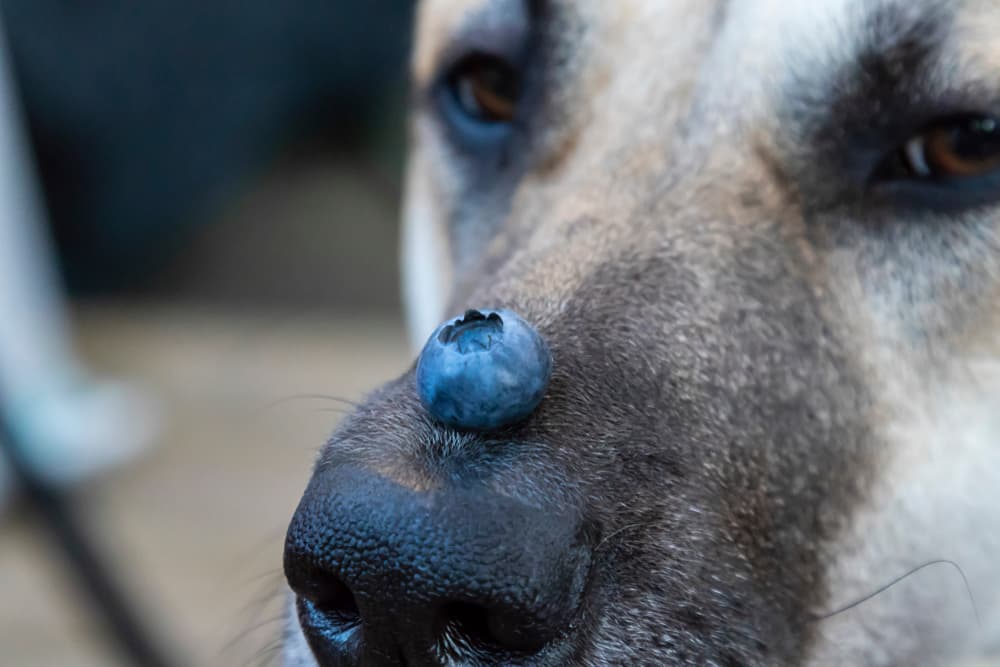
Blueberries aren’t bad for dogs. Generally, they’re safe for puppies, adult dogs, and seniors, alike. If you have a particularly small dog, keep in mind that they could be a choking hazard—so consider chopping or mashing them up.
One potential downside: If you feed your pup very large quantities of blueberries, they could end up with an upset stomach or constipation, says Morgan. That’s why it’s important to think of blueberries as an occasional treat to be enjoyed in moderation…not served by the bucket-full.
Blueberries and Dogs: Feeding Tips
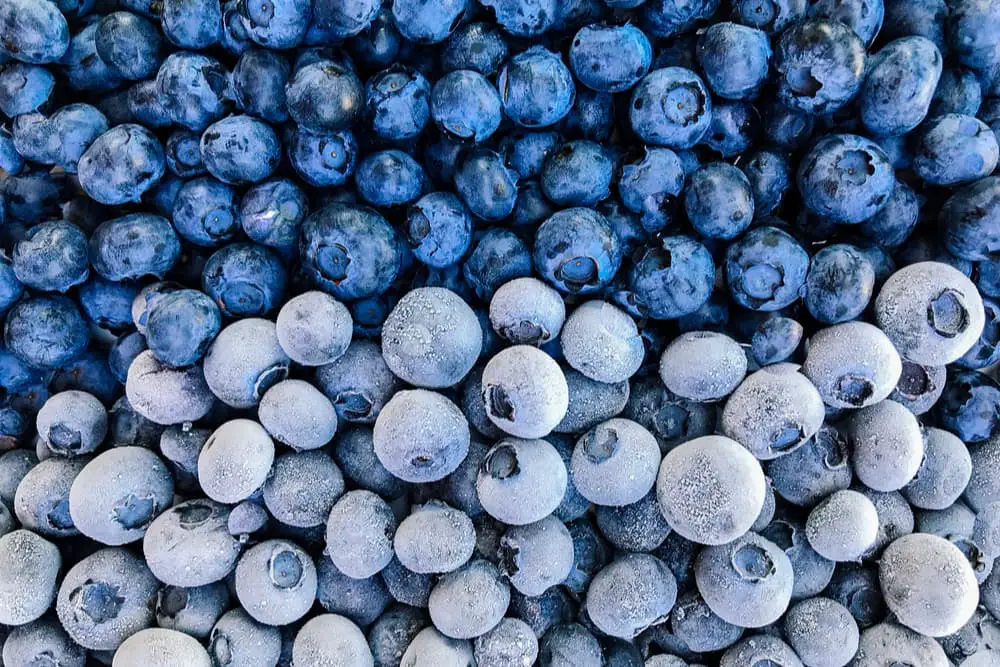
It’s okay to feed your dog fresh or frozen blueberries. Both options are healthier choices than dried blueberries, which can be high in added sugar and preservatives.
When preparing blueberries for your pup, wash them thoroughly with fresh water to remove any dirt or pesticides, just as you would for yourself, before serving them to your dog.
If you’re wondering just how many blueberries your dog can eat (and how often), follow the 10 percent rule: About 90 percent of your dog’s diet should be devoted to a dog food that provides complete and balanced nutrition. The rest can go to snacks like dog-friendly fruits, veggies, and treats, including blueberries.
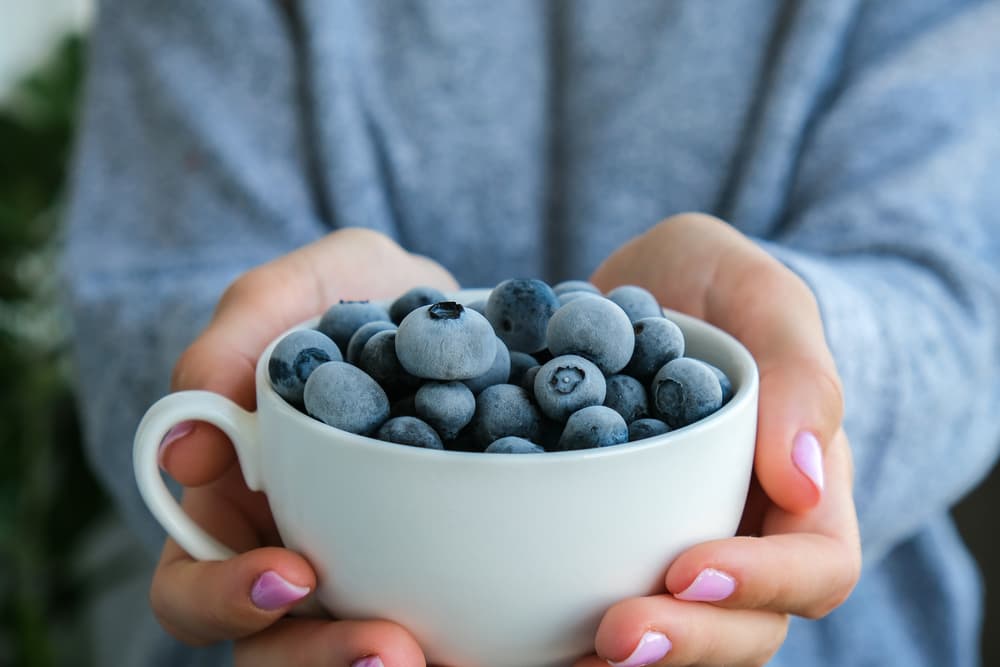
Of course, what this portion looks like will depend on the size of your dog. “Anywhere from a few blueberries a day for very small dogs to up to ¼ cup twice daily for larger dogs should be fine,” says Morgan.
As far as other treats go, consider most blueberry-based human foods off-limits for dogs. Don’t feed your little one baked goods like blueberry muffins or pancakes, which are often high in sugar and other ingredients that aren’t good for dogs, advises Morgan. The same goes for yogurt products with large amounts of added sugars or those containing artificial sweeteners, which can be toxic to dogs.
When serving your pup blueberries for the first time, watch them closely to detect any signs of an adverse reaction. Be sure to consult with your veterinarian if you have any questions or concerns about including blueberries in your dog’s diet.
Our Favorite Blueberry Dog Treats and Foods

Just because you shouldn’t split your blueberry muffin with your dog doesn’t mean they can’t enjoy a dog-friendly version of their own. Here’s a roundup of our favorite blueberry dog treats.
All featured products are chosen at the discretion of the author. However, Great Pet Care may make a small affiliate commission if you click through and make a purchase.
Fruitables Pumpkin & Blueberry Flavor Crunchy Dog Treats
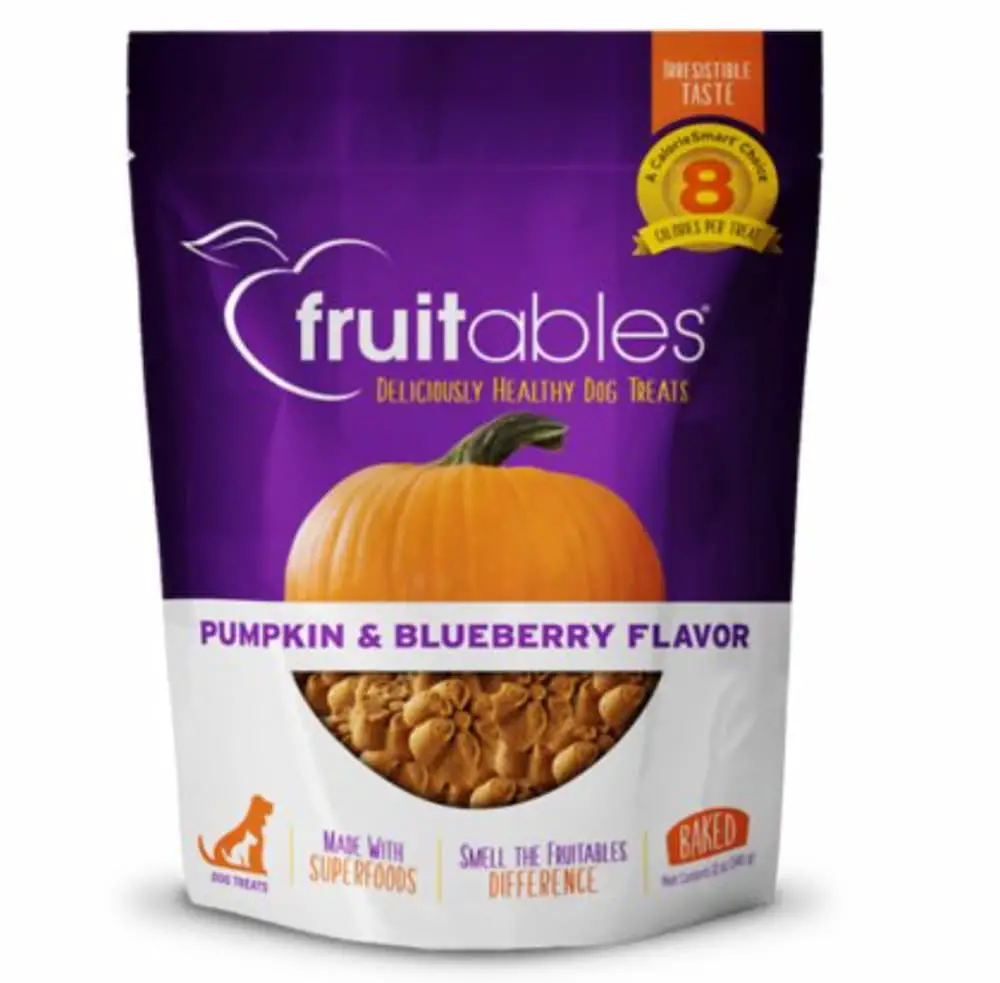
Pumpkin and blueberries? Nom! Inspired by freshly-baked blueberry muffins, these crunchy, bite-sized treats are packed with superfoods like pumpkin to boost immunity and antioxidant-rich blueberries, plus good-for-dogs ingredients like high-fiber potatoes to promote digestive health. Baked with care in an organic bakery, they taste and smell just like the real thing. Best of all, the recipe uses the company’s patent-pending CalorieSmart formula to balance palatability, calorie control, and satiety, so you can treat your dog to great-tasting goodies without the guilt.
Highlights
- Only 8 calories per treat.
- High in fiber and rich in antioxidants.
- Made without corn, soy, or wheat.
- Free of artificial flavors, colors, and preservatives.
- Baked in a certified organic bakery.
- Produced in the USA.
Things to Consider
- Crunchy treats may be too hard for dogs with sensitive teeth or gums.
- Some customers say the scent is unappealing.
Muttropolis I Guess That’s Why They Call It The Blueberry Munchers Dog Treats
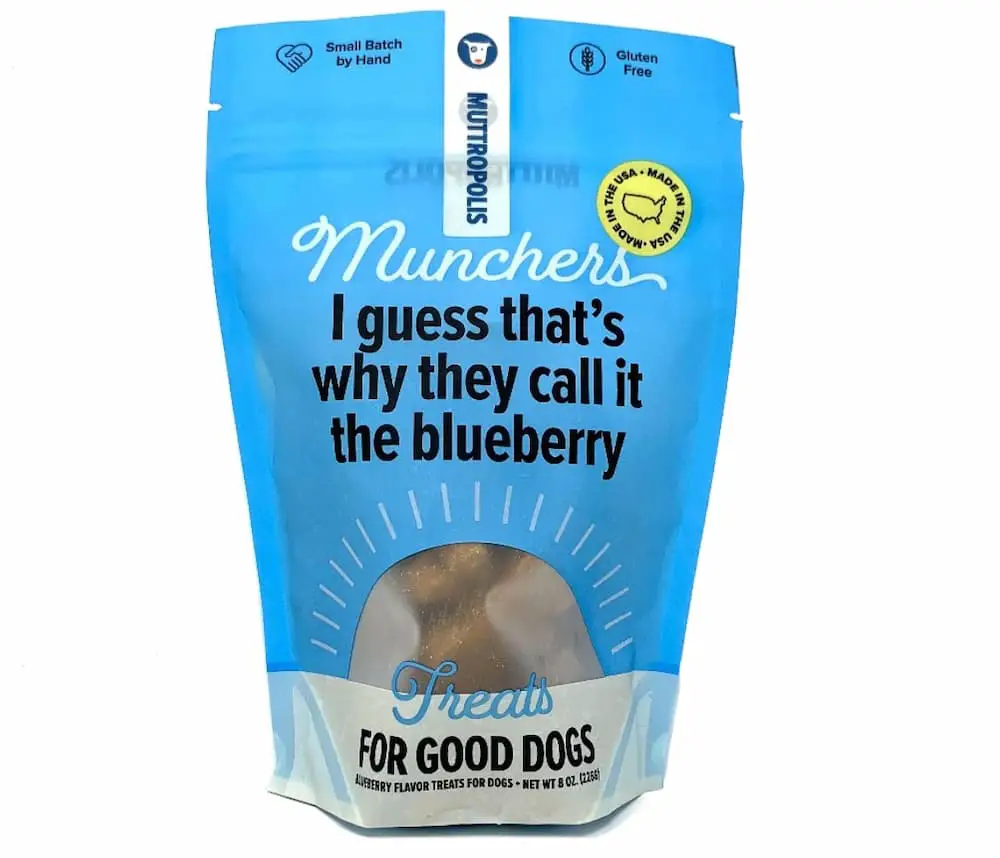
Reward your very good boy with these very good, small-batch, human-grade dog treats proudly made in San Diego. Featuring real ingredients like garbanzo beans, coconut flour, buckwheat flour, sweet potato, and dried blueberries, these irresistible munchers are high in protein and a good source of fiber. They’re also easily digestible and great for dogs with allergies because they’re grain and gluten free. According to one five-star reviewer, even her “extremely picky dogs” enjoy these treats.
Highlights
- Human-grade ingredients.
- Grain free and gluten free.
- Protein-rich.
- Good source of dietary fiber.
- Made in small batches in the USA.
Things to Consider
- Bone-shaped treats may be too large for smaller dogs. Consider breaking treats into pieces for puppies and smaller breeds.
- More expensive than other blueberry treats.
Nutro Crunchy With Real Mixed Berries Dog Treats
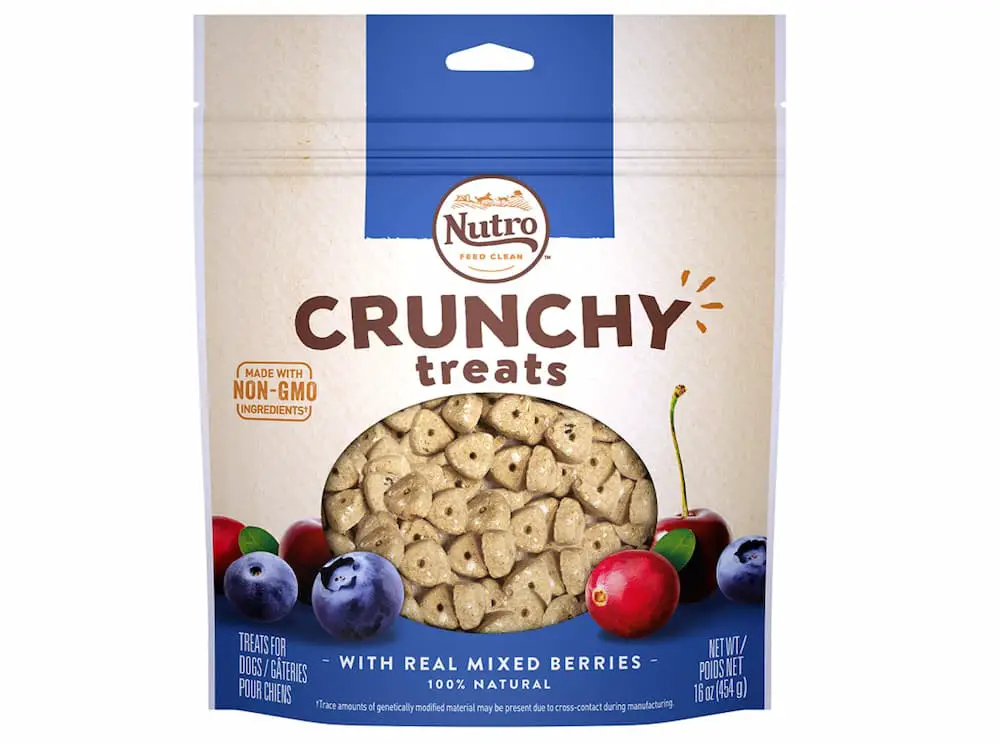
If you love knowing exactly where your food comes from, and your dog loves blueberries, Nutro’s crunchy, five-calorie treats are a win-win! Proudly made in Joplin, Missouri, with ingredients sourced from trusted farmers and suppliers, these berrylicious, bite-sized treats feature real blueberries, cherries, and cranberries. Packed with high-quality chicken protein and wholesome GMO-free ingredients, they’re another great pick to add to your treats cabinet.
Highlights
- Rich in nutrients and full of flavor.
- Perfectly bite-sized.
- Made with high-quality protein, not chicken by-product meal.
- Free of artificial preservatives, colors, or flavors.
- No corn, wheat, or soy protein.
- Wholesome, non-GMO ingredients.
- Resealable packaging.
- Made locally in Joplin, Missouri.
Things to Consider
- Features a berry-heavy scent to appeal to dogs. But some pet parents find the smell overwhelming.
- Treats may crumble easily if mishandled.
The post Can Dogs Eat Blueberries? appeared first on Great Pet Care.








